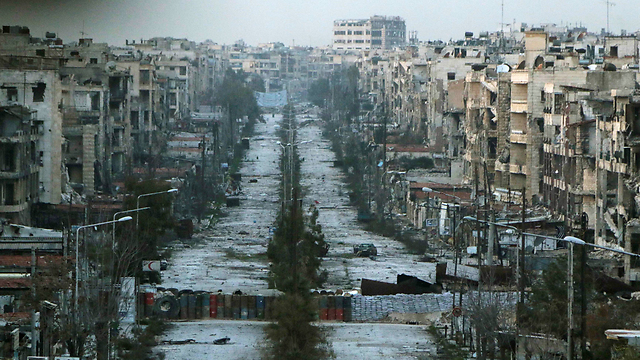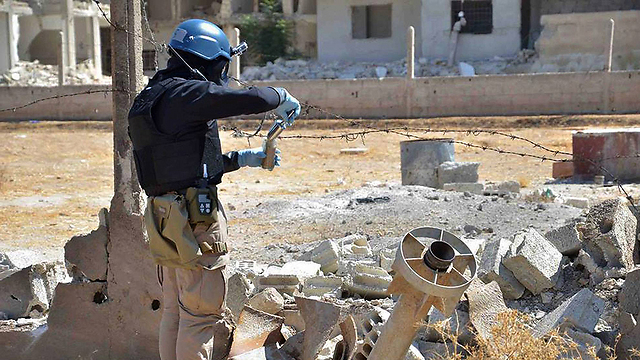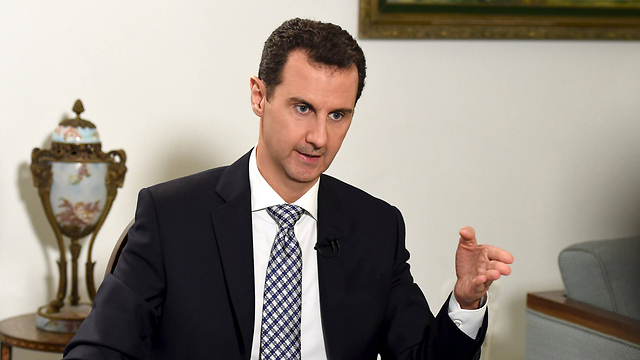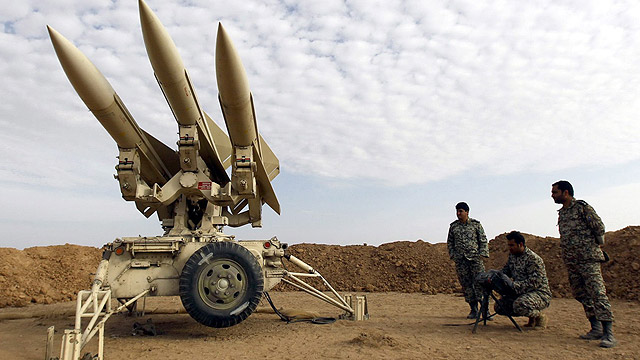Op-ed: It’s time for Israel to take a stand on the war in Syria: Moral and strategic concerns dictate that we must oppose Assad and work to push him out of power.
For five years now, Israel has opted to not take a side in the Syrian conflict. That policy can be justified, but still, it’s time to reconsider. In addition to the continuation of indiscriminant killing by the Assad regime and its allies, it’s been discovered recently that the Syrian dictator’s forces have gone back to using chemical weapons as well (specifically, sarin gas). The international community seems to be ignoring his obligation, made in 2013, to give up such arms.
Now, we need to take a stand and oppose Assad and his regime. First and foremost, we should do this for moral reasons. The repeated use of chemical weapons reminds us of our duty to internalize this fact: Assad is a loathsome murderer who’s brought about a horrifying human disaster. Nearly 400,000 people have died (most due to his army’s actions), about two million have been wounded, and 11 million have been turned into refugees. As humans, and especially as Jews, we cannot just stand aside.

Beside the moral argument, strategic concerns also indicate that the removal of the Assad regime would be in Israel’s interest. The radical axis led by Tehran, and which goes through Assad to Hezbollah, is the most tangible threat to our safety.
There are those who would say that the threat of ISIS is just as strong, and that we need to start there. While ISIS is not to be ignored, our strategic priority must be handling the Tehran-Baghdad-Damascus-Beirut axis first. This is because the international community has stood up and dedicated itself to handling ISIS, and they’ve had some success in stopping its progress.
Furthermore, the end of the Assad regime will likely weaken the attractiveness of ISIS, since the majority of Syrians—Sunni Muslims—would have a moderate alternative that shares their religious affiliation (unlike Assad, who is an Alawite Muslim —ed). On the Iranian front, however, Israel is nearly alone, with no one to rely on but itself. That’s why it needs to work against the Tehran-Assad-Nasrallah threat as its top priority. Iran and its allies pose a far greater danger to Israel than does ISIS.

Israel must develop a multi-faceted strategy on this matter. A basic condition for this is the creation of a local alliance, even an unofficial one, with Sunni powers such as Saudi Arabia, the Gulf States, Turkey, Jordan, and Egypt. In addition, a partnership with the United States on this issue is needed. Perhaps even a quiet understanding with Russia, which, unlike Iran, doesn’t see Assad as a necessary component to a future arrangement in Syria. The Sunni nations of the Middle East have shared interests with Israel as far as combating the radical axis is concerned.

What follows are seven points that describe an overarching strategy for weakening the radical axis and removing Assad from power:
![]() First, we should encourage diplomatic action against the crimes of the Assad regime, and aid in bringing it to justice for its roles in mass killings and its use of chemical weapons. Israel has the power to help expose the statistics of the killings, and spread news of it as far as possible.
First, we should encourage diplomatic action against the crimes of the Assad regime, and aid in bringing it to justice for its roles in mass killings and its use of chemical weapons. Israel has the power to help expose the statistics of the killings, and spread news of it as far as possible.
![]() Second of all, we need to enter a dialogue with the US about the need to harm assets that are important to the Assad regime as part of President Obama’s promise to go up against the regime for using chemical weapons, and to enforce their restriction as a non-negotiable international norm.
Second of all, we need to enter a dialogue with the US about the need to harm assets that are important to the Assad regime as part of President Obama’s promise to go up against the regime for using chemical weapons, and to enforce their restriction as a non-negotiable international norm.
![]() Third, it’s important that Israel prove it too has red lines and moral principles. Israel should considers limited military action, such as destroying helicopters that drop explosive barrels onto civilians. These actions are focused on saving human lives and can be done without committing to a large-scale, continuous, aerial offensive.
Third, it’s important that Israel prove it too has red lines and moral principles. Israel should considers limited military action, such as destroying helicopters that drop explosive barrels onto civilians. These actions are focused on saving human lives and can be done without committing to a large-scale, continuous, aerial offensive.
![]() Fourth, It’s possible to contend with the threat of ISIS in the southern Golan Heights, in the form of their local affiliate Shuhada al-Yarmouk (the Yarmouk Martyrs Brigades. —ed). That’s a way of showing that the fights against ISIS and Assad are not mutually exclusive.
Fourth, It’s possible to contend with the threat of ISIS in the southern Golan Heights, in the form of their local affiliate Shuhada al-Yarmouk (the Yarmouk Martyrs Brigades. —ed). That’s a way of showing that the fights against ISIS and Assad are not mutually exclusive.
![]() Fifth, Israel should work to encourage humanitarian stabilization in southern Syria, along the Israeli and Jordanian borders, with backing from international and local powers.
Fifth, Israel should work to encourage humanitarian stabilization in southern Syria, along the Israeli and Jordanian borders, with backing from international and local powers.
![]() Sixth, Israel should develop an understanding with Russia regarding the promotion of these steps, while preserving Russia’s strategic interests in northern Syria.
Sixth, Israel should develop an understanding with Russia regarding the promotion of these steps, while preserving Russia’s strategic interests in northern Syria.
![]() Seventh, Israel should encourage and support Arab nations’ actions in opposition to Hezbollah and Iran as much as possible.
Seventh, Israel should encourage and support Arab nations’ actions in opposition to Hezbollah and Iran as much as possible.
The Middle East is being restructured in a process that began five years ago. No one can yet see its end clearly. Still, it seems correct to assume that the participants are seeking a new arrangement. Israel has a deep interest in depowering the Iranians and Hezbollah in the “new” Middle East.

Gone are the days in which Israel could observe the goings-on, wishing good luck to both sides. It should not miss the opportunity to weaken its most bitter enemies. A moral, assertive, initiating, and creative policy in opposition to the radical axis is the path we must walk—especially with chemical weapons being used once more. It’s important that the Sunni Muslim world knows Israel was on the right side of this fight, and that it made the right moral and strategic moves, when Assad is finally gone.
Maj. Gen. (res.) Amos Yadlin is a former head of the IDF Military Intelligence Directorate (MID) and the current head of the Institute for National Security Studies (INSS) in Tel Aviv.
As reported by Ynetnews
